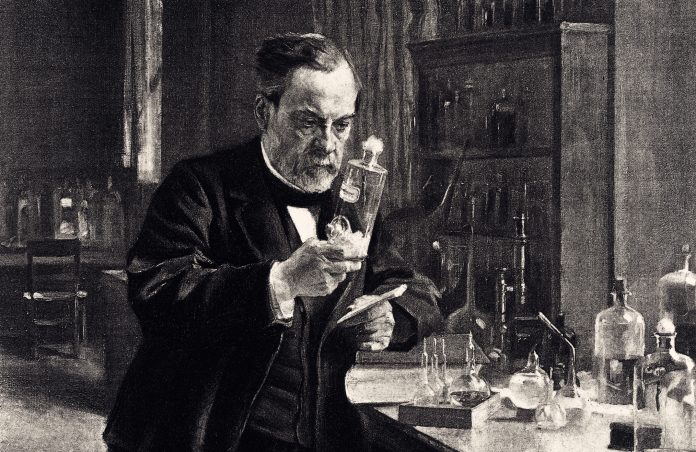Politics, ideology, and individual biases have influenced science at all times. According to sociologist Robert Merton (1942), the creation of universal and objective knowledge is dependent on the detachment of scientists from their work because passion and preconceived ideas are obstacles to objectivity and scientific progress
I examine this thesis using two case studies from the early history of research into the origin of life.
I. The scientific-political controversy about heterogenesis in 19th-century France: Pasteur and Pouchet
For centuries, the question of the origin(s) of life has been dominated by the general belief in the spontaneous generation of various forms of life, in which organisms either arise from organic debris (heterogenesis) or from inorganic matter (abiogenesis). Over time, this belief had been refuted for higher organisms, but in the 19th century, it was still prevalent in regard to microorganisms.
In France, the debate over spontaneous generation re-emerged in 1859 by a publication by natural historian Félix Pouchet, in which he showed that microorganisms appeared in liquids that had been boiled and then protected from dust (boiling was believed to destroy organisms). According to Pouchet, spontaneous generation created eggs chemically from residual organic matter by a “force plastique” (i.e., a vitalist force). This led to a controversy with Louis Pasteur, a renowned chemist and microbiologist, the founder of stereochemistry, and the originator of the germ theory of fermentation (see Morange 2022).
Based on his observations of the specificity of microorganisms in fermentation and vine diseases, Pasteur doubted the possibility of spontaneous generation, considering the experiments in its support too flawed to count as evidence. He thought that it would be impossible to demonstrate that spontaneous generation did not exist but he began to conduct experiments in support of an alternative explanation, namely that atmospheric germs (microorganisms) disseminate into the environment and thus appear in boiled liquids (Morange 2022).
In 1861, Pasteur published his results under the title “On the organized bodies which exist in the air: Examination of the doctrine of spontaneous generation”. He showed that microorganisms did not generate in a boiled liquid as long as dust or air (carrying micro-organisms) were prevented from entering it. However, as Pasteur himself cautioned, the debate about spontaneous generations could not be solved by experiments alone.
Some historians have argued that Pasteur’s passionate promotion of the improbability of spontaneous generation showed that he allowed himself to be guided by his ideological bias against spontaneous generation that was frequently embraced by anti-religious scholars (e.g., see Geison 1995). Pasteur, though not a religious person, belonged to the French cultural establishment.
But this argument overlooks that Pasteur’s experiments, unlike Pouchet’s, were known to have been exact, reproducible, and that they covered a wide range of different microorganisms. He knew about the stability and specificity of microorganisms and used statistics to test his hypothesis of the correlation between the purity of the air and the number of contaminated flasks with boiled liquids. Pasteur also examined possible causes for divergent results. It can therefore be concluded that whatever other reasons Pasteur might have had to reject spontaneous generation, he for sure had scientific reasons. Pasteur’s conclusions were soon supported by scientific developments in microbiology and biochemistry. By 1900, the doctrine of spontaneous generation was largely abandoned, and it was generally accepted that microorganisms, like cells of higher organisms, generate only from existing organisms of the same kind.
II. The ideological background of Oparin’s 20th century origin of life research in Russia/USSR
Alexander Oparin was a Russian/Soviet biochemist who became most famous for his booklet “Origin of Life” that appeared in Russian in 1923 and in English translation first in 1936, in which he expressed his view that “life appeared in the gradual evolution of primary organic substances” (Oparin 1953). Oparin was strongly influenced by German zoologist Ernst Haeckel, who, in his Monera theory of the plasmatic origin of life, suggested that the protoplasm of Monera served for nutrition and inheritance. Monera were primitive organisms that supposedly consisted only of a small mass of protoplasm. Oparin was particularly impressed by Darwin’s ideas of a gradual development in organic evolution that proceeded by small changes (Darwin 1859) and of the denial of essential differences between different modes of reproduction and between germ cells and soma cells (Darwin 1868). Mentioning the influence that Darwin also had on Friedrich Engels, Oparin emphasized the similarity of Engels’ view that life must have “resulted from a long evolution of matter, its origin being merely one step in the course of its historical development to his own (Oparin 1953). In the USSR, Darwin was highly appreciated among other things because of his materialist viewpoint, and Mendel’s and Morgan’s ideas of genetics were considered as idealistic and an attack upon Darwinism.
Oparin proposed a metabolic concept of the origin of life, similar to JBS Haldane in 1929: he speculated that heterotrophic interactions during a slow and lengthy period of abiotic syntheses and accumulation of organic compounds were crucial for a gradual origin of life. He did not support this belief experimentally, but in 1953, Stanley Miller and Harold Urey demonstrated the possibility of a synthesis of amino acids from inorganic constituents under supposed conditions of the origin of life, thus supporting Oparin and Haldane. Oparin’s book is widely held to have initiated modern origin of life research.
According to Oparin, molecules self-assembled into large liquid-like structures: “complex coacervates” (today: colloidal assemblies) to form protocells. His colloidal view of life centered on colloidal aggregates of indeterminate composition, believing that biological inheritance was the outcome of growth and division of these coacervate drops, and that the nucleus, plastids, and other organelles were “but the visible reflections of the inner physico-chemical structures, which determine the course of vital processes” (Oparin 1953).
The ideological frame of Oparin’s work
Epitomized by the power on biology that agronomist Lysenko received under Stalin, political ideology in the USSR led to the flourishing of outdated Haeckelian and Darwinian concepts of heredity for decades, allowed scientists or pseudoscientists such as Lysenko, to propagate outdated or fraudulent anti-genetic theories, and enabled or forced the exclusion of modern informational concepts (of biological specificity, chromosomes, genes) in theories of the origin and evolution of life.
Oparin adhered to Lysenko’s pro-Darwinian anti-genetic doctrines, rejecting informational concepts and advocating the primacy of proteins, quoting Engels’ statements that “life is a form of the existence of protein bodies“ and that protein is not living matter, “but hidden in its chemical structure is the capacity for organic evolution” (Oparin 1953).
According to various historians, Oparin supported the anti-genetic ideology in order to survive. However, the experiences of a colleague of Oparin, V. Y. Aleksandrov (1993) call this interpretation into question: He showed that already before Lysenko came to power, Oparin supported his view of two opposite directions that confront each other in modern biology—”the progressive – materialistic teaching of Michurin and the reactionary – idealistic teaching of the followers of Weismann, Mendel, Morgan.” Aleksandrov also made clear that “at the very end of 1955 [Oparin] continued to zealously defend the pseudoscience of not only Lysenko, but also Lepeshinskaya, despite the fact that by this time many articles had already been published exposing their data, and despite the fact that there was no longer any reason to fear repression for defending the truths of real science.”
The American geneticist and Nobel laureate Hermann Muller, a communist himself but shocked by the repression of genetics under Lysenko, at first appreciated Oparin’s work as a study of the first step of the origin of life. However, he later strongly criticized Oparin’s rejection of the informational second step that involved the gene as an instructive hereditary entity. Oparin proposed that “protoplasm had originated first and had the capability of manufacturing not only the genetic material but also its own complex organization” According to Muller, “This was the view which would naturally develop out of Haeckel’s idea that in the transition from inanimate to animate matter proteins and other constituents of living matter gradually developed and through a kind of natural selection gained an ever greater ability to build up or anabolize, to counteract their continual decay or catabolism, and thereby grew and even, by falling apart into smaller pieces that again grew, came to reproduce and finally also to manufacture genetic materials that had differentiated in them. The Russian Oparin has since the early 1930’s espoused this view and has followed the official Communist Party line by giving the specific genetic materials a back seat.” (Muller 1961, cited in Falk and Lazcano 2012).
III. Concluding remarks: Science, ideology, and basic biological principles in origin of life research
1. Preconceived opinions or ideological biases can contribute to scientific progress. Pasteur’s scientific and possibly ideological antipathy against spontaneous generation motivated him to refute it. His passion and preconceived ideas were accompanied by the knowledge of organisms’ specificity and experimental skills.
Oparin’s materialistic view and belief in Darwin’s gradual evolution motivated him to conduct seminal research on the heterotrophic origin of life as a staunch supporter of Lysenko and the Soviet State.
2. Ideologies are detrimental when they lead to the adherence to outdated concepts or the disregard or rejection of basic biological principles, such as specificity or information, and constancy. Oparin disregarded or rejected chromosomes as carriers of genes and genetic factors as causes for the emergence of the specificity and stability of life forms and for organic evolution. Though he is remembered as one of the pioneers of origin of life research, he was not involved in later developments that were based on the information concept.
3. Current attempts to revive Oparin’s concept of coacervates in physico-chemical explanations of life disregard the constancy of developmental outcome, heredity, and the stability of species that cannot be convincingly explained without taking into account the causal role of the genome and its transgenerational transmission.
Bibliography
Aleksandrov, V.Y., 1993. On the road to recovery (in Russian). In Difficult years of Soviet biology: Notes of a contemporary. Nauka: St. Petersburg. http://vivovoco.astronet.ru/VV/BOOKS/ALEXANDROV/CHAPTER_3.HTM
Darwin replace: CR.by C.R. 1859. On the origin of species by means of natural selection, or the preservation of favoured races in the struggle for life. John Murray, London.
Darwin replace: C R. by C.R.1868. The variation of animals and plants under domestication. John Murray, London.
Falk, R., Lazcano, A., 2012. The forgotten dispute: A.I. Oparin and H.J. Muller on the origin of life. Hist. Phil. Life Sci. 34, 373-390. https://www.jstor.org/stable/pdf/43831418.pdf
Geison, G.L., 1995. The private science of Louis Pasteur. Princeton University Press: Princeton.
Merton, R.K., 1942. The sociology of science: Theoretical and empirical investigations. University of Chicago Press: Chicago and London.
Morange, M. 2022. Pasteur. Gallimard: Paris.
Oparin, A.I., 1953. The origin of life. Dover Publications: New York.











